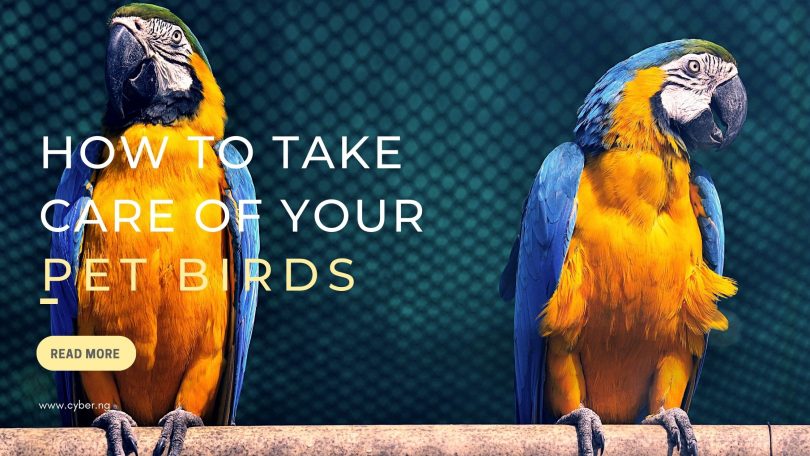Birdpets are quite different from dogs and cats. They’re very sociable and sustained by companionship. To successfully groom one, you should have enough pet handling skills as they are delicate and can die if mishandled.
How To Take Care Of Your Pet Birds
Every living thing has basic needs of shelter, feeding, and clothing. Your bird needs a good shelter place, good feeds, and not necessarily clothing but proper care. They need to take the proper hygiene so as not to fall ill and die by the way.
Make them comfortable at home and interact with them, to keep them happy. Suppose you’re thinking about owning a bird pet, this is for you.
You could begin with low-maintenance birds like parakeets, finches, and canaries. Here we’ll talk about tips for taking care of your birds.
Good and comfortable shelter
Get a cage or bird house for your birds. Keep the cages away from direct sunlight. An area less sunny and cool would do. The cage should be well built and large enough for their wings.
A general way to achieve this is when the width of the cage is at least twice the bird’s wingspan
Avoid smoking around your birds as it’s harmful to them. Ensure the cage bars are not too small as their talons might be trapped. It shouldn’t be large too so the bird’s head won’t get stuck in them.
Go for a rectangular cage and not a circular one and keep them in a room not isolated. Don’t keep them near the window as they are a target when left there.
Good feeding and water
Birds are fed bird seeds, celery, spinach, fruits, parsley, dandelion, and milk thistle. Avoid dehydration and supply them with fresh and clean water. This prevents dehydration and aids them in their bath as they love water a lot.
Avoid dry and packaged seeds, as they’re not nutritious to the birds. A bird feed should mainly be 75% pellets and 25% human meals.
Although you may not know what’s best for your bird, employ the services of an avian veterinarian and ask questions to guide you.
Feed them daily with fresh seeds and no leftovers. A saying goes, “Variety is the spice of life that gives it all its flavor”. Feed them with fruits and vegetables, giving them that green touch.
Also, have a fixed time to feed them their meals and stick to it. Growing or smaller birds should be fed more often due to higher metabolism.
Get a large, wide. but shallow dish to supply them with water they could drink and bathe. Place it close to their feed to remind them to drink after eating.
You can also place the food in different places to help them endeavour to search for food. Don’t forget to change the water as they could bathe in it.
Access to sunlight and darkness
If it’s in a cage inside a room, try to make room for sunlight rays to reach them. Don’t hide them in a hidden place. As well as they need sunlight, so do they need darkness. Let them be in the dark for about 10-12 hours daily.
The research discovered birds reared in 4 and 7 hours of darkness, increased in weight, and fed more in the dark. If the time extends, the birds feed more, having more in their crop.
Therefore, give them access to light and darkness to help in their growth journey.
Create a playtime
All work and no play make Jack a dull boy. Yes, they don’t necessarily work, but they shouldn’t be caged all day. Engage them in playful exercise. Get them toys to keep them busy in the cage and let them out of their cage weekly.
In their outdoor play, find a safe place where they can learn and explore skills in flying. Pet and talk to them too. Eat meals with them. This way, a maximum bond between you and your pet.
Ensure they’re Safe from enemies
Every living thing is prey to another. This is why your pet should be kept safe from its enemies. Major bird predators are cats, bats, squirrels, foxes, snakes, and coyotes and at any given chance, they kill the birds.
Another way to keep them safe is to get them a secured cage. One large enough for them to comfortably move around and flap their wings.
When they get out of their cage, supervise their flying, preventing them from being a target to predators.
Adopt the necessary hygiene
The benefits of good hygiene can’t be overemphasized. Just as we need to make our environment clean and neat, so does our pet’s environment needs to be neat. Don’t wait till everywhere gets so dirty before you clean up.
Sweep their cage or room to remove dirt from their feed or poop. Don’t forget to get a bird-safe cleaner to spray the dirty places in the cage and always replace the cage liner.
Wash the food and water containers with dishwashing liquids like sunlight. Let there be water available so they can go and bathe as this is essential for their health.
Teach them to take their bath till they get used to doing it themselves.
Having a bird pet comes with lots of responsibilities that are rewarding. If you’re considering having one, why not. Take these tips, and have a wonderful bird pet experience.








